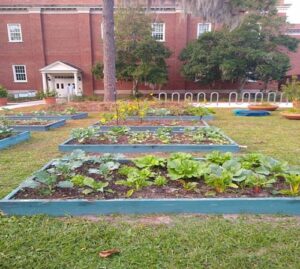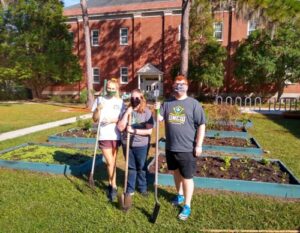How University Gardens Fight Student Food Insecurity and Build More Sustainable Food Systems
I’m watching the sunset as water glistens from the hose onto the freshly sprouted kale, mustard greens, and cabbage heads. I wave to friends who have stopped by to chat and eye the greenhouse plants and see how the crops in the raised beds have grown. People often stop us on their way to class or jogging to ask about the garden.
They tell me how wonderful it is to see people gardening and working together outside. Longleaf pine needles lay scattered in the dirt amongst the crops and between the leaves and I brush them aside to weed. The sunflowers, flashing their yellow petals, dance in the light breeze as if to welcome me back. Despite it being midterm week and in the midst of a global pandemic my heart feels at ease and I’m able to catch my breath. I can still smell the freshly laid soil and fertilizer the garden club put in from our latest volunteer day. Since starting the University of North Carolina Wilmington’s Gardening Club and becoming a Rachel Carson Council Fellow, I never realized how therapeutic gardening would be, and how many new friends I’d make. Many of the club members have loved the opportunity to get back outside and reconnect with the Earth, especially since most classes have shifted to online. In the midst of the pandemic, students don’t get to see their friends often. Being able to come together and garden has been a welcome social activity for all. Many volunteers have mentioned how nice it is to get out of the house and lend a hand.
 I’ve watched how the garden has grown and have started to reflect upon the obstacles that have been tackled and the ones still needing to be overcome. All the new people I’ve come to know. I can’t believe it’s already been over a year. It hasn’t been easy. Struggles with finding funding, working collaboratively with different types of people (some reliable and others not), working with people’s competing schedules, getting the word out about what it is we are doing to combat food insecurity and gaining support has at times been a struggle. But it has also been more rewarding than I could’ve imagined. I’ve seen how a community can come together to help one another and offer their time to get their hands dirty and reconnect with where their food comes from. For example, we were struggling to gain SGA funding due to COVID-19 this semester, but the office of student leadership and engagement provided us with seeds, fertilizer, and soil so we could continue our gardening efforts and continue supporting the university food pantry.
I’ve watched how the garden has grown and have started to reflect upon the obstacles that have been tackled and the ones still needing to be overcome. All the new people I’ve come to know. I can’t believe it’s already been over a year. It hasn’t been easy. Struggles with finding funding, working collaboratively with different types of people (some reliable and others not), working with people’s competing schedules, getting the word out about what it is we are doing to combat food insecurity and gaining support has at times been a struggle. But it has also been more rewarding than I could’ve imagined. I’ve seen how a community can come together to help one another and offer their time to get their hands dirty and reconnect with where their food comes from. For example, we were struggling to gain SGA funding due to COVID-19 this semester, but the office of student leadership and engagement provided us with seeds, fertilizer, and soil so we could continue our gardening efforts and continue supporting the university food pantry.
 Though the raised beds at Friday Hall have been established at UNCW for a while, it has only been since this year we have been growing produce for the Hawks Harvest student food pantry. And this is our first autumn since starting the gardening club. Though gardening and sustainable agriculture is fairly new to UNCW, others have been gardening and growing food far longer. Nevertheless, UNCW already utilizes the garden space to teach plant systematic classes and sustainability courses. And plans have begun to have a gardening class count as a gym requirement for physical education through the University. Everytime we get volunteers to work in the on-campus gardens they gain a stronger understanding of what food insecurity is like at their university and for their classmates. Many don’t even know we have so many students struggling with food security.
Though the raised beds at Friday Hall have been established at UNCW for a while, it has only been since this year we have been growing produce for the Hawks Harvest student food pantry. And this is our first autumn since starting the gardening club. Though gardening and sustainable agriculture is fairly new to UNCW, others have been gardening and growing food far longer. Nevertheless, UNCW already utilizes the garden space to teach plant systematic classes and sustainability courses. And plans have begun to have a gardening class count as a gym requirement for physical education through the University. Everytime we get volunteers to work in the on-campus gardens they gain a stronger understanding of what food insecurity is like at their university and for their classmates. Many don’t even know we have so many students struggling with food security.
Rutgers University in New Jersey, John Hopkins Eastern in Baltimore, Bard College of New York, Duke University in North Carolina, Texas A & M, University of California Berkeley and UC Davis all have on-campus community gardens. This initiative has been spreading and expanding rapidly across the nation over the past 15 to 20 years with over 60 established university gardens. Yet this is still a relatively new phenomenon. Most university campus gardens have only been established since 2001 as American students have become more educated and aware of the sustainability and environmental ethos. As college student food insecurity rises so do campus garden initiatives to help relieve this issue.
 The 2019 national survey College and University Basic Needs Insecurity surveyed 86,000 students from 123 two- and four-year universities. It found that 60% of students had experienced food insecurity within the past thirty days or housing insecurity within the past year. Students that were at higher risk of basic needs insecurity included students at two-year institutions, LGBTQIA students, African Americans, military veterans, and former foster youth. Food insecure students are those worrying about whether or not they will run out of money before they can afford to buy more groceries, are unable to purchase and make balanced meals, or they skip meals even if they are hungry. This is where university campus gardens can help fill the need in the campus community through supplying locally-sourced produce to campus food pantries.
The 2019 national survey College and University Basic Needs Insecurity surveyed 86,000 students from 123 two- and four-year universities. It found that 60% of students had experienced food insecurity within the past thirty days or housing insecurity within the past year. Students that were at higher risk of basic needs insecurity included students at two-year institutions, LGBTQIA students, African Americans, military veterans, and former foster youth. Food insecure students are those worrying about whether or not they will run out of money before they can afford to buy more groceries, are unable to purchase and make balanced meals, or they skip meals even if they are hungry. This is where university campus gardens can help fill the need in the campus community through supplying locally-sourced produce to campus food pantries.
The University of California Berkeley has over ten urban gardens that produce food, preserve native ecosystems, and helps to increase local biodiversity. This communal space helps to set the standards for urban agriculture on-campus by creating micro-scale food systems to fight student food insecurity. Most of the gardens, much like UNCW, harvest food for the campus food pantry. The gardens also play an integral role in offering space for experimental education and facilitating collaboration for interdisciplinary research. The agricultural initiatives are entirely student-led by community-based organizations that prioritize inclusion and equitable distribution of food. Berkeley also offers courses such as agricultural ecology, sociology and political ecology of agro food systems, and introduction to the plant sciences. Pomona College is another California campus whose organic farm is a part of its Environmental Analysis program as well as business courses. Started in 2005, the campus garden is utilized in soil science courses and is used as a toll in writing theses in areas such as politics and environmental science. Students operate a bi-weekly farm stand where the food is sold to local residents.
 Central Carolina Community College has an entire entrepreneurial sustainable agriculture program that educates students on how to be financially independent and ecologically minded in starting and operating a farm. The land lab garden is an essential part of biology classes and the food is utilized in the school’s culinary program as well. Rutgers University in New Jersey is home to the nation’s largest organic farm managed by students. The university’s Student Sustainable Farm is a self-sustaining CSA program. Each year 4-6 student interns manage the operation with some assistance from faculty. The produce grown by the farm is donated to local food banks in the areas and given to shareholders.
Central Carolina Community College has an entire entrepreneurial sustainable agriculture program that educates students on how to be financially independent and ecologically minded in starting and operating a farm. The land lab garden is an essential part of biology classes and the food is utilized in the school’s culinary program as well. Rutgers University in New Jersey is home to the nation’s largest organic farm managed by students. The university’s Student Sustainable Farm is a self-sustaining CSA program. Each year 4-6 student interns manage the operation with some assistance from faculty. The produce grown by the farm is donated to local food banks in the areas and given to shareholders.
Teaching students to grow their own food offers them more independence and deeper understanding and respect for where their food comes from. More than 100 higher education institutions have established community campus gardens. With names ranging from SLUG (Student Led Unity Garden at The University of Portland) and VEGI (Vanderbilt Educational Garden Initiative, Vanderbilt University) to “The Burning Kumquat” at the Washington University in St. Louis and “The Forge Garden” at Santa Clara University, these gardens invite many and varied participants, and cultivate richer communities in the process. These on-campus micro-gardens are also reducing average food travel miles from garden to table creating more sustainable food systems. The vast majority of energy used in the U.S. food system (around 80 percent) goes to processing, packaging, transporting, storing, and preparing food. Produce in the U.S. travels, on average, 1300 – 2000 miles from farm to consumer. When you compare that to harvesting at the campus garden and just walking across the street to the food pantry, it puts things into perspective. By saving time in transportation the produce is going to be fresher, higher in nutrients, and we know for sure the food we grow is not exposed to pesticides or chemicals.
 — Julianna Tresca, Rachel Carson Council Fellow, UNCW. Julianna Tresca is a senior at the University of North Carolina – Wilmington majoring in Geology and Environmental Science with a focus in geospatial technologies. Her RCC Fellowship project is on housing and food insecurity. [email protected]
— Julianna Tresca, Rachel Carson Council Fellow, UNCW. Julianna Tresca is a senior at the University of North Carolina – Wilmington majoring in Geology and Environmental Science with a focus in geospatial technologies. Her RCC Fellowship project is on housing and food insecurity. [email protected]
All photos taken by UNCW Gardening Club, photographer Jillian Butler
![]() The Rachel Carson Council Depends on Tax-deductible Gifts From Concerned Individuals Like You. Please Help if You Can.
The Rachel Carson Council Depends on Tax-deductible Gifts From Concerned Individuals Like You. Please Help if You Can.
![]() Sign up Here to Receive the RCC E-News and Other RCC Newsletters, Information and Alerts.
Sign up Here to Receive the RCC E-News and Other RCC Newsletters, Information and Alerts.






